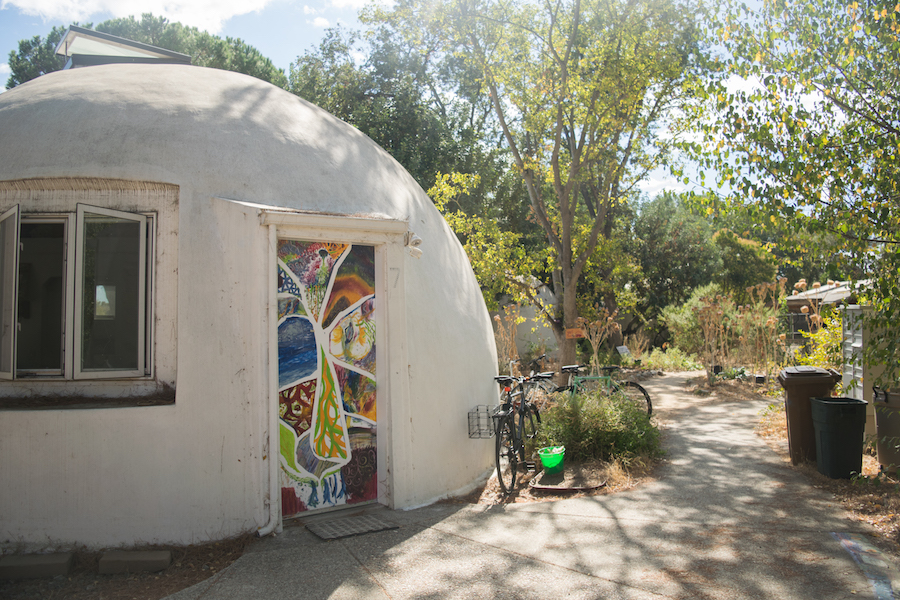
Students find alternate housing options in co-ops, animal barns
Not many students can say they’ve lived with real-life sheep. Isabel Olaes, a second-year animal science and management major, has become accustomed to waking up to the “baa-ing” of her neighbors.
“I was apprehensive [to live in the sheep barn] because it is the complete opposite […] of the dorms,” Olaes said. “It’s funny […] you’re sleeping and you wake up and you can hear baa-ing. It’s fun having sheep as roommates.”
While many UC Davis students move out of the dorms and into off-campus apartments or houses after their first years are over, there are some students who choose alternate places of dwelling, such as the sheep barn, located in West Davis.
Olaes lives in the sheep barn with two other roommates, both of whom also care for the sheep. The three students together are responsible for feeding the 300 sheep in the mornings, putting them away at night and moving them from one pen to another when needed.
According to Olaes, the textbook experience differs greatly from the reality of the work. With 84 pregnant ewes currently occupying the barn, breeding has become an entirely new form of education for Olaes.
“You think it’s easy to stick a tube down a premature lamb’s throat? It’s not.” Olaes said. “This morning we woke up and there were […] six [newborn] lambs on the ground. You have to take action. You can’t procrastinate with animals, because it’s a life.”
The sheep barn is just one of the alternate living arrangements available for students with interests in animal science — other places, such as the horse barn, dairy barn, feedlot, beef barn, goat barn and swine facility, offer similar housing situations.
The Solar Community Housing Association (SCHA) is an organization that was founded on providing low-income housing for students interested in sustainability and diverse environments. One branch of SCHA contains the Tri-Cooperatives, which are located on campus near the Segundo Residence Halls.
“We basically want to have people here who can create a safe space, that are interested in doing things that are more sustainable for the Earth and for the campus,” said Scott Bowden, a third-year English major and member of the Pierce House in the Tri-Cooperative branch. “I love being a part of a community that’s like-minded, [yet] we all have so many differences.”
The three houses, Davis Student Cooperative (DSC), Pierce House and Agrarian Efforts House, all strive to maintain a community in which students feel safe and at-home on a low budget. All of the houses have gardens to grow their own produce, and together they plan weekly shopping trips to the Davis Co-op.
“It’s really nice to have a family to come back to; it’s a good support system,” said Shannon Ferguson, a fourth-year cognitive science major and member of the DSC house. “We cook as a house, we also buy food together as a house. The goal is to grow our own food so we don’t have to put as much resources towards buying things.”
Each house meets once a week to discuss chores and issues regarding the Tri Co-op community. The houses also have committees responsible for specific tasks; the social justice committee, for example, ensures respect within the community, and the pollinator committee holds people accountable for growing ecology-healthy crops that draw in pollinators like bees and butterflies.
Another goal of the Tri-Cooperatives is to create a community filled with diversity. According to Ferguson, the houses “want to be a safe space for oppressed groups.” With 12 to 15 people living in one house, however, things do get complicated.
“It definitely takes a certain type of person to live in a community like this, because there’s always people around,” said Peter Varas, a third-year sustainable agriculture and food systems major and member of the Pierce House. “[There are] two bathrooms [for] 12 people, [and] some of the other houses only have one bathroom, so coordinating time schedules can be difficult sometimes, but it’s been pretty good. [So far] we haven’t really had any challenges.”
Another branch of the SCHA is the Baggins End Domes, located at the west edge of campus. The Domes, similar to the Tri-Cooperatives, house students interested in agriculture via an alternative place of living.
“We have an intentional community where we try to be there for each other and […] emphasize sustainability but also social justice,” said Laura Losmozos, a fourth-year geology major and member of the Domes community. “If I need an ingredient for food or if I just need someone to hang out with, I feel like I always have someone to rely on.”
Like the Tri-Cooperatives, the Domes host weekly meetings as well as community dinners four times a week. Students living in the Domes are expected to uphold their responsibilities to the community, which include gardening, cooking and cleaning.
“If any conflict comes up between two community members, I can’t help feeling like it’s kind of my responsibility to make everything work,” Losmozos said. “Communication and accountability can be a struggle sometimes, just because everyone is a busy student, and we still have [other] stuff to do.”
Though living in the Domes can be a lot of work, the sense of community makes up for these challenges according to residents.
“My second year I lived at an apartment complex, which was fine […] but I felt a little isolated,” Losmozos said. “[I wanted] something to connect with, and I liked this idea of having a community.”
UC Davis students agree that living in alternative housing such as the Tri-Cooperatives, the Domes or the animal barns is a learning experience worthwhile.
“You’ll learn how to cook, you’ll learn how to take care of bees, you’ll learn so much stuff,” Bowden said. “[We] live together and thrive.”
Written by: Allyson Tsuji – features@theaggie.org








